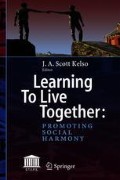Abstract
At its best, empirical research opens new and fruitful directions for exploring what it means to be human. In this essay. I will describe several aspects of research on the brain that seem to me to have this character, suggesting that we can and should think of ourselves, individually and collectively, as active creators and revisers of meaning, for ourselves and for the world we find ourselves in. I will conclude with several social policy recommendations that follow from this perspective.
Access this chapter
Tax calculation will be finalised at checkout
Purchases are for personal use only
References
Carpenter, R. H. S. (1999). A neural mechanism that randomizes behavior. Journal of Consciousness Studies, 6, 13–22.
Crick, F. (1994). The astonishing hypothesis. NY: Scribner.
Dalke, A., & Grobstein, P. (2007) Story telling in (at least) three dimensions: an exploration of teaching reading, writing, and beyond. Journal of Teaching Writing 23(1), 91–114.
Dalke, A., Cassidy, K., Grobstein, P., & Blank, D. (2007). Emergent pedagogy: Learning to enjoy the uncontrollable and make it productive. Journal of Educational Change 8(2i), 111–130.
Damasio, A. R. (1994). Descartes’ error: Emotion, reason and the human brain. New York: Putnam.
Fodor, J. A (1983) Modularity of mind. Cambridge: MIT Press.
Galistel, C. R. (1980). The organization of action. Hillsdale, New Jersey: Lawrence Erlbaum.
Gardner, H. (1983). Frames of mind: The theory of multiple intelligences. New York: Basic Books.
Gladwell, M. (2005). Blink. New York: Little, Brown.
Glimcher, P. W. (2005). Indeterminacy in brain and behavior. Annual Review of Psychology, 56, 25–56.
Grobstein, P. (1991). From genomes to dreams. Bryn Mawr Alumnae Bulletin. Winter. http://serendip.brynmawr.edu/gen_beh/Dreams.html.
Grobstein, P. (1994). Variability in brain function and behavior. In V. S. Ramachandran (Ed.), Encyclopedia of human behavior (Vol. 4, pp. 447–458). New York: Academic Press.
Grobstein, P. (2002). Who’s afraid of Emily Dickinson? …Or I learned to stop worrying and love the brain. Newsletter of the Psychoanalytic Center of Philadelphia. http://serendip.brynmawr.edu/gen_beh/Dreams.html.
Grobstein, P. (2004) Writing Descartes: I Am and I Can Think, Therefore. Retrieved November 1, 2007, from http://serendig.brvnmawr.edu/sci_cult/lesswrong/descartes/.
Grobstein, P. (2005a). Making the unconscious conscious, and vice versa: A bidirectional bridge between neuroscience/cognitive science and psychotherapy. Cortex, 41, 663–668.
Grobstein, P. (2005b) Revisiting science in culture: Science as story telling and story revising. Journal of Research Practice, 1(1), Article M1. Retrieved November 1, 2007, from http://jrp.icaap.org/index.php/jrp/article/view/9/18.
Grobstein, P. (2007) lnterdisciplinarity, transdiciplinarity, and beyond: The brain, story sharing, and social organization. Journal of Research Practice, 3(2), Article M21. Retrieved November 1, 2007, from http://jrp.icaap.org/index.php/jrp/article/view/98/92.
Grobstein, P. (in press) From complexity to emergence and beyond: towards empirical non-foundationalism as a guide to inquiry. Soundings. http://serendip.brynmawr.edu/reflections/Emergence07.pdf.
Haidl, J. (2003). The emotional dog and its rational tail: A social intuitionist approach to moral judgement. Psychological Review, 108, 814–834.
Kandel, E. R. (2006). In search of memory. New York: Norton.
Kelso, J. A. S. (1982). Human motor behavior: An introduction. Hillsdale, New Jersey: Lawrence Erlbaum.
Maye, A., Hsieh, C., Sugihara, G., & Brembs, B. (2007). Order in spontaneous behavior. PLoS ONE, 2(5), e443.
McDermott, R., &Varenne, H. (1995). Culture as disability. Anthropology and Education Quarterly, 26, 323–348. http://serendip.brynrnawr.edu/sci_cult/culturedisability.html.
Minksy, M. (1986). The society of mind. New York: Simon and Schuster.
Monod, J. (1971). Chance and necessity. New York: Knopf.
Ramachandran, V. S. (2003). Phantoms in the brain. Reith Lecture 1. http://www.bbc.co.uk/radio4/reith2003/lecturel.shtml.
Rorty, R. (1993). Trotsky and the wild orchids. Common Knowledge, 1(3), 140–153.
Schrodinger, E. (1943). What is Life? New York: MacMillan.
Skinner, B. F. (1971). Beyond freedom and dignity. New York: Knopf.
Sperry, R. W. (1956). The eye and the brain. Scientific American.
Author information
Authors and Affiliations
Editor information
Editors and Affiliations
Rights and permissions
Copyright information
© 2019 Springer International Publishing AG, part of Springer Nature
About this chapter
Cite this chapter
Grobstein, P. (2019). The Brain as a Learner/Inquirer/Creator: Some Implications of Its Organization for Individual and Social Well Being. In: Kelso, J. (eds) Learning To Live Together: Promoting Social Harmony. Springer, Cham. https://doi.org/10.1007/978-3-319-90659-1_14
Download citation
DOI: https://doi.org/10.1007/978-3-319-90659-1_14
Published:
Publisher Name: Springer, Cham
Print ISBN: 978-3-319-90658-4
Online ISBN: 978-3-319-90659-1
eBook Packages: Social SciencesSocial Sciences (R0)

